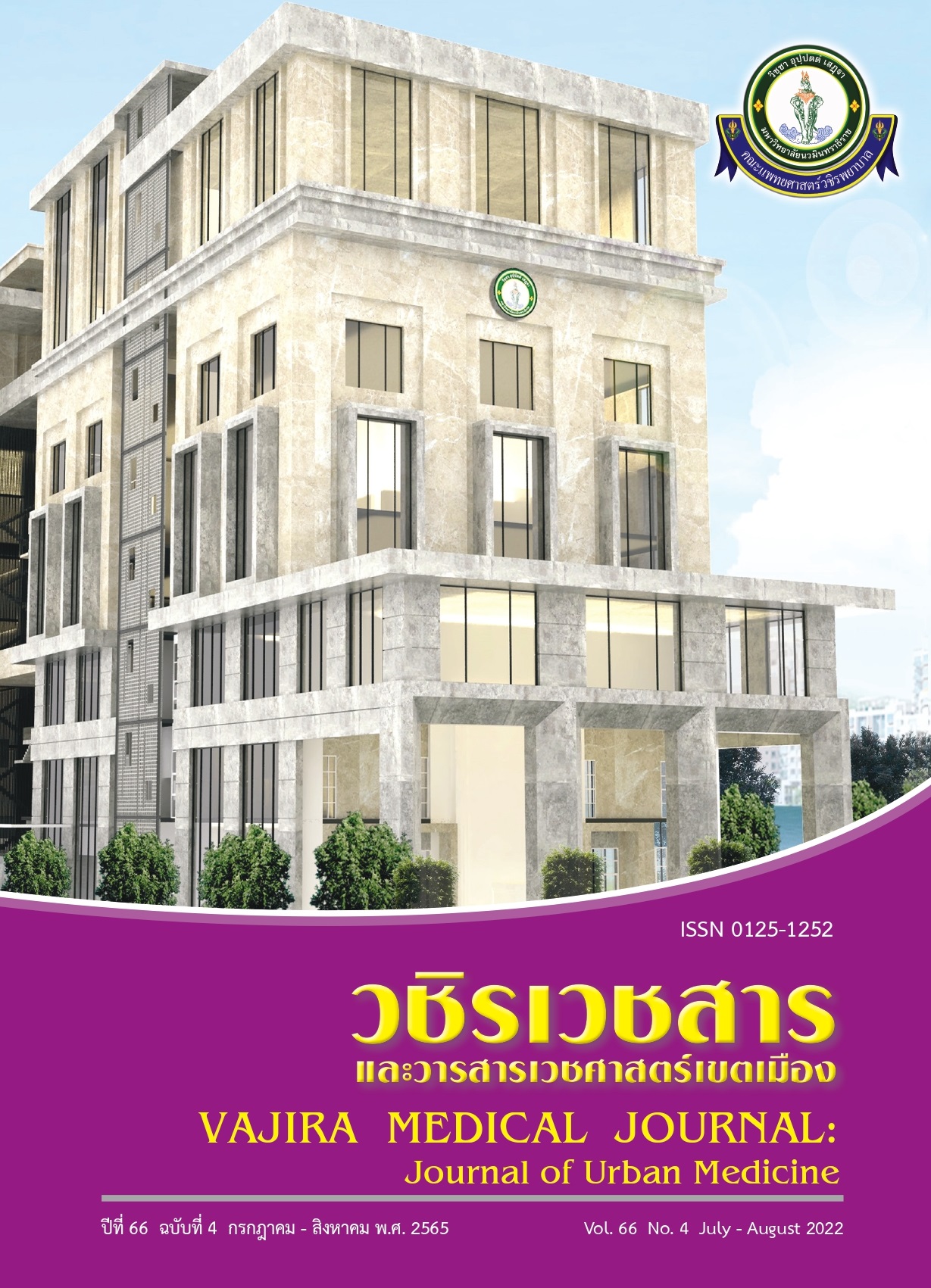Relationship between Resilience Quotient and Mental Health Problems in Urban Late Adolescents
Main Article Content
Abstract
Objective: To study the level and relationship of resilience and mental health in urban late adolescents.
Method: This is a cross-sectional descriptive study. The participants are students in Navamindradhiraj university who are between the ages of 18-21 years. The outcome measures include general personal data, resilience quotient questionnaire and depression anxiety stress scale (DASS-21). The statistical analyses are Pearson Chi-square and multiple regression analysis.
Results: From the total participants of 425, most of them is female (82.6%), domicile outside of Bangkok (59.8%), lives with family (74.6%), the eldest child (52.9%), with two siblings (46.4%), studied in health sciences (90.6%), average GPA 3.32 (S.D. = 0.43) and enrolled in a direct admission system (70.6%). Most of them had resilience quotient at normal level (56.5%). The average resilience scores were 54.6 ± 5.92 (Mean ± S.D.).Mental health problems were mostly anxiety (65.6 %) followed by stress (58.8 %), and depression (51.3 %). The extremely severe mental health problems among participants were found in anxiety (7.8 %), stress (19.5 %), and depression (8.0 %). Resilience is inversely related to stress, anxiety and depression (r= -.399, -.345 and -.345 respectively, p<0.01). From stepwise multiple regression analysis, resilience in the domain of will power together with emotional stability can predict depression and stress. The variance of depression is 29.4percent (R2= 0.294, p<0.01). And the variance of stress is 16.6 percent (R2= 0.166, p<0.01). Will power domain is the key predictor of depression (β =-0.318, p<0.01) and emotional stability domain is the key predictor of stress (β = -0.271, p<0.01). Emotional stabilitydomain is also the only domain that can statistically predict anxiety (β = -0.343, p<0.01). The variance of depression is 11.7 percent (R2= 0.117, p<0.01).
Conclusion: Resilience is an important protective factor for late adolescents' mental health problems. Therefore, in order to reduce stress, anxiety and depression in late adolescents, an enhancement of resilience is beneficial, particularly in the domain of emotional instability and will power.
Downloads
Article Details

This work is licensed under a Creative Commons Attribution-NonCommercial-NoDerivatives 4.0 International License.
References
King RA. Adolescence. In: Martin A, Volkmar FR, editors. Lewis’s child and adolescent psychiatry: a comprehensive textbook. 4th ed. Philadelphia: Lippincott William’s & Wilkins; 2007. P.279-90.
Department of Mental Health. Stress in adolescent [Internet]. 2020 [cited 2020 Aug 15]. Available from: https://dmh.go.th/news-dmh/view.asp?id=30188.
Vatanasin D. Prevention of adolescent depression: from evidence to practice. The Journal of Faculty of Nursing Burapha University 2016;24(1):1-12.
Inkaew S, Phalitnontkiet Y, IamSa-at S, Danwattana S. Turning bad into good: resilience quotient. Nonthaburi: Bureau of Social Mental Health, Department of Mental Health, Ministry of Public Health; 2009.
Hu T, Zhang D, Wang J. A meta-analysis of the trait resilience and mental health. Personal. Individ Differ 2015;76:18–27.
Intaprasert S, Maneetorn B, Maneetorn M. Correlation between emotional intelligence and level of stress in first-year medical students of Chiang Mai University. J Psychiatr Assoc Thailand 2003;48:231-8.
Leonie R. Perceived stress, depression and anxiety in university students: the role of resilience [dissertation]. University of Twente; 2019.
Poole JC, Dobson KS, Pusch D. Childhood adversity and adult depression: the protective role of psychological resilience. Child Abuse Negl 2017;64:89–100.
Goldstein AL, Faulkner B, Wekerle C. The relationship among internal resilience, smoking, alcohol use, and depression symptoms in emerging adults transitioning out of child welfare. Child Abuse Negl 2013;37:22–32.
Pollack MH, Stein MB, Davidson JR, Ginsberg DL. New challenges for anxiety disorders: where treatment, resilience, and economic priority converge. CNS Spectr 2004;9:1-4.
Registration and processing department, Navamindradhiraj University. Current student registration. Bangkok: Registration and processing department, Navamindradhiraj University;2020.
Department of Mental Health. Resilience quotient assessment. Bangkok: Department of Health Service Support, Ministry of Health;2007.
Oei TP, Sawang S, Goh YW, Mukhtar F. Using the depression anxiety stress scale 21 (DASS-21) across cultures. Int J Psychol 2013;48:1018-29.
Leeyutthanont M, Uraiwan P. Factors related to the resilience quotient among people in Surathani province. Thai Journal of Nursing 2011;60(2):48-55.
Harabutra T, Dangdomyouth P. Selected factors to resilience quotient of Schizophrenic patients’ caregivers in community. The Journal of Psychiatric Nursing and Mental health 2013;27(3):113-24.
Polk LV. Toward a middle-range theory of resilience. ANS Adv Nurs Sci 1997;19(3):1-13.
Chootong R, Wiwattanaworaset P, Buathong N, Noofong Y, Chaithaweesup P, Cheecharoen P, et al. Mental health status, family state and family functioning of undergraduate students in a Southern University, Thailand. J Psychiatr Assoc Thailand 2019;64(4):337-50.
Jiang N, Yan-Li S, Pamanee K, Sriyanto J. Depression, anxiety, and stress during the COVID-19 pandemic: comparison among higher education students in four countries in the Asia-Pacific Region. JPSS [Internet]. 2021 Apr [cited 2021Aug.22];29:370-83. Available from: https://so03.tci-thaijo.org/index.php/jpss/article/view/244216
Sriyarat K, Jiebna V. Relationships between Resilience Quotient (RQ) and perceived self – efficacy and academic achievement in psychiatric nursing practicum course of senior nursing students, Thai Red Cross College of Nursing. The Journal of Psychiatric Nursing and Mental Health 2015;29(1):76-92.
Somkittikanon P, Muksrinak P, Seebuaban K. Relationships between resilience quotient and learning outcome of psychology courses of psychology students, Saint Louis College. Journal of The Royal Thai Army Nurses 2017; 18(3):160-9.
Suksri A, Nintachan P, Taweekoon T. Relationships between resilience and depression and aggressive behaviors in adolesccents exposed to violence. The Journal of Psychiatric Nursing and Mental health 2016;30(2):97-112.
Jirathikrengkrai C, Vongsirimas N, Thanoi W, Phetrasuwan S. Factor in predicting psychological well-being in late adolescents. Nurs Sci J Thai 2021;39(2):77-89.
Huisman M, Klokgieters SS, Beekman ATF. Successful ageing, depression and resilience research; a call for a priori approaches to investigations of resilience. Epidemiol Psychiatr Sci 2017;26(6):574-8.


